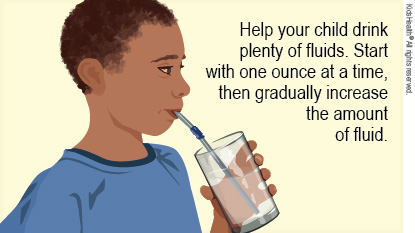Vomiting Treated With Medicine: How to Care for Your Child
Vomiting usually isn't serious and goes away in a day or two. It's important to help your child stay hydrated. The nurse gave your child a medicine to stop the vomiting. Most of the time, vomiting in kids is due to gastroenteritis. Gastroenteritis usually happens because a virus infects the stomach and intestines. You can help your child feel comfortable and stay hydrated while the infection gets better.


Giving Liquids
-
Give an oral electrolyte solution (such as Pedialyte®, Enfalyte®, or a store brand) to help your child stay hydrated. It has the right amount of water and electrolytes (sodium and potassium) for kids.
-
Give your child small amounts of the oral electrolyte solution every few minutes.
-
You can use an oral syringe, a medicine cup, or a kitchen spoon.
-
Start with 5–10 ml of oral electrolyte solution.
-
After 1 hour, if your child is doing well, give 15–20 ml.
-
Continue to give this amount every few minutes for the next hour or two until your child is peeing as usual.
-
If your child vomits, start over with a smaller amount of liquid.
-
You also can give frozen electrolyte pops (brand names include Pedialyte®, and many stores have a store brand), water ice, and flavored gelatin.
-
There's no need to avoid milk. But do not give your child sports drinks, sodas, or full-strength (undiluted) fruit juices, which have a lot of sugar.
Starting Food
-
If your child hasn't vomited in 8 hours, offer small amounts of plain foods, such as toast, crackers, rice, or mashed potatoes. Yogurt, fruits, vegetables, and plain cooked chicken are also OK.
-
After your child has gone 24 hours without vomiting, you can go back to offering a regular healthy diet.
Medicines
-
Don't give medicines for nausea, diarrhea, or vomiting, unless prescribed by your health care provider.
-
You can give medicine for pain if your health care provider says it's OK. Use these medicines exactly as directed:
-
acetaminophen (such as Tylenol® or a store brand)
-
OR
-
ibuprofen (such as Advil®, Motrin®, or a store brand). Do not give to babies under 6 months old.
-
Don't give aspirin to your child or teen as it’s linked to a rare but serious illness called Reye syndrome.

Your child:
-
has vomiting that lasts longer than 1 to 2 days
-
has belly pain
-
has frequent watery diarrhea
-
has blood in the poop (bowel movements)
-
refuses to drink liquids or is vomiting after drinking clear liquids

Your child:
-
has severe belly pain
-
has a swollen or hard belly
-
has vomit that's bright green, red, or brown
-
is very tired and hard to wake up
-
appears dehydrated; signs include dizziness, drowsiness, a dry or sticky mouth, sunken eyes, crying with few or no tears, or peeing less often (or having fewer wet diapers)

How can we prevent gastroenteritis from spreading? To help prevent the spread of gastroenteritis, teach all family members to wash their hands well and often. They should wash for at least 20 seconds with soap and water. Clean tabletops, doorknobs, and other hard surfaces with a cleaner that kills viruses. Keep your child out of child care or school until 24 hours have passed with no vomiting.
Does my child need an antibiotic for gastroenteritis? No, your child doesn't need an antibiotic. The health care provider believes a virus caused your child's illness, and antibiotics don't work against viruses. Viral illnesses usually go away on their own without special medicines. Help your child feel comfortable and stay hydrated while the infection gets better.